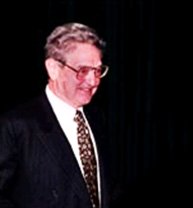George Soros Biography – His Rags to Riches Story, His Controversial Pro-freedom Activism and His Economic Theories
This page is a long one. It contains a George Soros biography as well as an overview of George Soros books and the economic theories he has put forward (plus a few George Soros quotes).

Because he deserves it - he's a fascinatingly controversial man with a tough background history and some very interesting things to say. Also, he has spent an awful lot of money on what he considers worthy causes, making him one of the biggest philanthropists of our time.
George Soros (whose original birth name was György Schwartz) was born on August 12, 1930 in Budapest, Hungary. He was fourteen years old when, in 1944, the Nazis invaded Hungary. He managed to survive the Battle of Budapest which saw house-to-house combat throughout the city. Only 3 years later he witnessed another invasion of his country, this time by the Communist Soviet Union.
Years later, in a George Soros biography by Michael T. Kaufman, the effect of the war and totalitarianism was made clear when Soros stated he felt that all people are entitled to live without oppression. And, of course this very pro-democratic attitude of Soros' is also obvious from his philanthropic work, which (among many other things) includes a great deal of effort to promote peaceful democratization in the post-Soviet states of Central and Eastern Europe.
Soros has literally spent billions of dollars on this non-violent democratization effort, and both Eastern and Western observers agree that he and his Open Society Institute (OSI) were prime players in the peaceful transition from communism to capitalism in his original home country of Hungary during the mid-to-end 1980s as well as in 'the Rose Revolution' of Georgia in the early 2000s.
In 1947, fleeing the Soviet Communist occupation of Hungary, Soros moved to England and received a degree from the London School of Economics. He held a variety of odd jobs until he eventually landed an entry-level position at a merchant bank in London. Soros' career in the financial sector took off from there.
He moved to New York and worked as an analyst and arbitrage trader. It was during this time that Soros developed his theory of reflexivity which states that the valuation of a market produces a circular influence that has an effect on the market.
George Soros Biography: His Incredible Wealth
In 1967, Soros got an opportunity to run a hedge fund and an offshore investment fund. A few years later, he established his own fund and became chairman of Soros Fund Management, which later changed into the world famous Quantum Fund.Some people have called Soros 'The Man Who Broke the Bank of England' because in the beginning of the 1990s he claimed that the Pound Sterling was overvalued, and speculated against the British Pound, betting on this being true. Apparently it was, because in 1992 the Bank of England ran into serious trouble and had to devaluate (the so-called Black Wednesday UK currency crisis), which earned Soros somewhere between 1 and 2 billion US dollars from that particular deal.
George Soros went on to become one of the most successful investors and experts on the economy alive today. Here's a video on YouTube where he addresses the Euro crisis of 2012, using simple, reasonably understandable terms, yet showing a deep insight into the dynamics of national economics:
Soros is consistently ranked (by e.g. Forbes Magazine) as one of the top 10 richest men in the USA as well as being one of the 30 richest people in the world. And as far as hedge fund managers go, he is by far the wealthiest - though he is now retired. His net worth is estimated to be around twenty billion US dollars.
George Soros Biography: His Philosophy
Soros is influenced by Karl Popper's work in the philosophy of science as well as Popper's critique of totalitarianism.Popper's book 'The Open Society and Its Enemies', originally published in 1945, states that the truth is not found in any one philosophy or ideology and that totalitarian societies have inherent problems because they do not allow for democracy, individual rights, differing opinions and freedom of expression. The only way for a society to flourish, says Popper (and Soros, too), is to explicitly allow for the diversity of all those things.
Hence George Soros's intense activism on behalf of freedom, rights and people's well-being. And hence Soros's serious criticism of the way the USA has behaved politically and financially in recent decades, particularly the big financial and geopolitical issues. But Soros has also donated millions of US dollars to people who try to modernize US drug laws, immigration laws, the welfare system as well as improve the care for the dying and the way mental patients are treated in prisons.
George Soros Biography: His Economic Theories
Soros has developed his own economic theories, one of which includes the concept of 'reflexivity' which has to do with the fact that ... while classic economic theory has a number of assumptions about markets and the participants in them (buyers, sellers and governmental regulators) ... real life looks quite different:Among other things, I developed a model of a boom-bust process or bubble which is endogenous to financial markets, not the result of external shocks. According to my theory, financial bubbles are not a purely psychological phenomenon. They have two components: a trend that prevails in reality and a misinterpretation of that trend.
~ George Soros quotes ~
Here's how some of the most important factors in that equation work out:
1. In classic economic theory markets are supposed to always trend towards equilibrium - Soros says that this is simply not the case - markets MAY trend towards equilibrium, but they may just as well trend towards financial - as well as political - 'bubbles' (like the 'dot com bubble' in the early part of the 2000s or the housing price bubble many Western countries experienced a few years later). He call this a boom-bust process - it starts out as a self-replicating boom, only to have the 'bubble' bust some time later - with a financial and/or political crisis as a result.
2. In classic economic theory the market participants of buyers, sellers and political regulators are supposed to perfect knowledge of the situation. This, says Soros, is simply not the case. On the contrary the market participants are quite fallible and have very imperfect knowledge ... and THIS is the basis of their decisions. In other words, people try to interpret and predict markets and trends, but they cannot and they fail, sometimes repeatedly, causing unexpected situations that are very far removed from classic economic theory, and trying to fix those situations using those outdated theories may add to the problem instead of solving it.
3. In classic economic theory the 'forces' that interact in a market are assumed to NOT interfere with each other. In reality, Soros says, the market forces are in a constant state of interplay. For example, when something in a market gets out of hand, the governmental regulators sometimes step in and try to remedy that. But perhaps the market has already anticipated this intervention and acted accordingly, and so the intervention doesn't work as the regulators intended, which means that the regulators need to regulate again, which the market will then try to anticipate - and so on.
In the year 2008 the United States and Europe suffered the so-called Crash of 2008 , the worst economic crisis in those regions in over 75 years. This crisis was triggered by a lack of liquidity (as well as corruption and plain old stupidity) in the United States banking system, but there were other reasons as well why it became as severe as it did.
George Soros had seen all this coming, and had been warning the world about it for quite some time. Also, the happenings after 2008 were 'textbook Soros' so to speak, so after 2008 his economic theories became more widely accepted. Says Soros himself (in 2012):
Until recently, my interpretation of financial markets was either ignored or dismissed by academic economists. All this has changed since the crash of 2008. Reflexivity became recognized but, with the exception of Imperfect Knowledge Economics, the foundations of economic theory have not been subjected to the profound rethinking that I consider necessary. Reflexivity has been accommodated by speaking of multiple equilibria instead of a single one. But that is not enough. The fallibility of market participants, regulators, and economists must also be recognized. A truly dynamic situation cannot be understood by studying multiple equilibria. We need to study the process of change.
~ George Soros ~
Hailed as Philosopher, Philanthropist and Activist - as Well as the Opposite
Soros has received honors as well as honorary doctoral degrees from several schools and prestigious universities, including (among others): the University of Oxford, the Corvinus University of Budapest, the University of Bologna and Yale University.Nevertheless Soros is a controversial figure on the world scene, criticized from the left because he is so rich and has made his money by investing (starting with next to nothing), and criticized from the right because his ideas about - and work in favor of - freedom, democracy, human rights, education and public health fly in the face of the opinions and interests of some of his conservative peers.
Thus George Soros has earned the very funny but somewhat ambiguous honor of being loathed by the extreme left for being too capitalist while at the same time being reviled by the extreme right for being too socialist/Marxist. Someone once stated that "this goes to show how just how nutty the wing nuts are."
One time, when he received an honorary degree from Oxford University, Soros himself was asked how he would like to be described. His answer was: "I would like to be called a financial, philanthropic and philosophical speculator." Which is probably a pretty precise way of describing him.
George Soros Biography – His Predictions
As mentioned above the articles and books written by George Soros pretty much predicted the current (2012) economic recession. His book, "The New Paradigm for Financial Markets" warned readers about the super bubble that had been building over the last couple of decades and was on the brink of collapse.While he doesn't claim to always be right, Soros appears to be able to read economic trends on a global scale. Two of his other books predicted economic trends that eventually came to pass. These include, "The Alchemy of Finance," and "The Crisis of Global Capitalism."
And, of course, in the matter of his foresight there is also his track record in investments to think about - it is absolutely unsurpassed. His return on investment is astronomical!
What Others Have Said about George Soros
Paul Tudor Jones II in his foreword to 'The Alchemy of Finance: Reading the Mind of the Market' wrote this about George Soros:Four hundred seventy-three million to one. Those are the odds against George Soros compiling the investment record he did as manager of the Quantum Fund from 1968 through 1993. His investment record is the most unimpeachable refutation of the random walk hypothesis ever! ... History will probably remember Mr. Soros as the speculator who tilted against the Bank of England in 1992 (and freed the English people from recession). His billion dollar score is simply too compelling a story to overlook. Mr. Soros himself would probably like to be remembered as a great economist or even scientist. But I am going to remember him for something even more important, for which he does not receive the credit he deserves. He is someone who genuinely cares about the state of the human condition and tries to better it. His myriad and monumental philanthropical efforts will qualify him as one of history's great benefactors. ... He is a hands-on workaholic who materially impacts the quality of lives of people less fortunate than he. Now this, this is a sign of greatness.
~ Paul Tudor Jones II ~
Matt Welch in "Open Season on 'Open Society'" in Reason magazine (8 December 2003) wrote this about George Soros:
George Soros has a long and storied track record of being all villains to all people. Nobody that rich, and that meddlesome in international affairs - through his massive, market-influencing hedge-fund bets against national currencies, or via his multi-billion dollar "Open Society" philanthropy in 50-plus countries - could avoid being fitted for devil's horns on a daily basis.
~ Matt Welch ~
George Soros Biography: The Controversial George Soros Books
• "SOROS: The Unauthorized Biography, the Life, Times and Trading Secrets of the World's Greatest Investor" was written by Robert Slater and published in 1997. In this George Soros biography, Slater lays out the philosophy and strategies Soros used to gain influence over world economics.• "Soros on Soros" is an autobiography written by George Soros and published in 1995. Soros uses this book to sum up his life's work. He offers readers a glimpse into his personal life and the way of thinking that turned him into a financial wizard.
• "Soros: The Life and Times of a Messianic Billionaire" was written by Michael T. Kaufman and was published in 2003. This George Soros biography starts with his early, penniless life and follows Soros as he makes his mark on Wall Street. The author gives readers a personal glimpse of a shy man whose life was given purpose when he escaped Nazi oppression.
George Soros Biography: His Philanthropy and Being a Maverick
As noted in the George Soros biography by Chuck Sudetic called "The Philanthropy of George Soros: Building Open Societies," Soros is one of the leading philanthropists in modern times. He has established foundations and gives to other charities in hopes of establishing for others the chance to lead free and productive lives.It is estimated Soros has given away over eight billion dollars - so far. Most of it going to people and organizations who work for freedom, human rights, public health, education and democracy in all parts of the world - and he's not afraid to support controversial figures and causes, either. Here's a couple of several George Soros quotes that demonstrate it:
Just as the process of repealing national alcohol prohibition began with individual states repealing their own prohibition laws, so individual states must now take the initiative with respect to repealing marijuana prohibition laws.
~ George Soros ~
Regulating and taxing marijuana would simultaneously save taxpayers billions of dollars in enforcement and incarceration costs, while providing many billions of dollars in revenue annually.
~ George Soros ~
The background for the above George Soros quotes is Proposition 19 which was put forward in 2010 and which, had it passed, would have legalized marijuana in the state of California. Soros donated $1 million USD in support of Proposition 19.
(For more quotes by George Soros, please check out the page George Soros Quotes. There are a LOT of quotes by George Soros on that page!
As an example of his funding of education he donated the largest amount Europe has ever seen (€420 million Euros, approx. $615 million USD) to Central European University in Budapest.
And another one of the many George Soros quotes that show this ultra-rich man's unusual disposition and his reasons to be critical of the very system that made him rich is this one:
I think there's a lot of merit in an international economy and global markets, but they're not sufficient because markets don't look after social needs.
~ George Soros ~
Also, Mr. Soros is critical of the US elite:
The people currently in charge have forgotten the first principle of an open society, namely that we may be wrong and that there has to be free discussion. That it's possible to be opposed to the policies without being unpatriotic.
~ George Soros quotes ~
Clearly George Soros is a man who follows his heart.
George Soros Biography: More George Soros Books
 |
• "George Soros on Globalization" was
published in 2005 and is available as a book or ebook. In this book, Soros takes
a look at why global economic companies fail. He also discusses whether it is
possible for a global economy to succeed and what its implications are for
individual citizens. If you click on the image to the left it will open a new tab/window on Amazon.com, where users have given this book 3.5 stars out of 5. The book can also be bought as an ebook in the flexible Amazon Kindle format (which works on PC, Mac, Android smartphone & tablet, iPad and iPhone) - to check out the Kindle ebook on Amazon.com, please click this link: George Soros On Globalization |
 |
• "The Age of Fallibility: Consequences of the War
on Terror" is a book and ebook that was published in 2007. This book is another
examination on the policies of the Bush Administration and how they affect human
rights and the development of an open society. If you click on the image to the left it will open a new tab/window on Amazon.com, where users have given this book 3.5 stars out of 5. The book can also be bought as an ebook in the flexible Amazon Kindle format (which works on PC, Mac, Android smartphone & tablet, iPad and iPhone) - to check out the Kindle ebook on Amazon.com, please click this link: The Age of Fallibility: Consequences of the War on Terror |
 |
• "The Crash of 2008 and What it Means: The New Paradigm for Financial Markets" is a book, ebook, and audio book that was published in 2009. In this book, Soros takes a look at the causes of the Crash of 2008 and then offers a set of policies that will get the economy back on track. If you click on the image to the left it will open a new tab/window on Amazon.com, where users have given this book 3.5 stars out of 5. The book can also be bought as an ebook in the flexible Amazon Kindle format (which works on PC, Mac, Android smartphone & tablet, iPad and iPhone) - to check out the Kindle ebook on Amazon.com, please click this link: The Crash of 2008 and What it Means: The New Paradigm for Financial Markets |
| "Financial Turmoil in Europe and the United
States: Essays" was published in 2012 and is a book, audio book, and ebook. This
collection of essays takes a look at the domestic and foreign economic policy
decisions that led to the recession. Soros then adds his analysis on what could
have been done to save the economic crash. If you click on the image to the left it will open a new tab/window on Amazon.com, where users have given this book 3.5 stars out of 5. The book can also be bought as an ebook in the flexible Amazon Kindle format (which works on PC, Mac, Android smartphone & tablet, iPad and iPhone) - to check out the Kindle ebook on Amazon.com, please click this link: Financial Turmoil in Europe and the United States: Essays |
George Soros Biography – His Legacy
The story of George Soros is inspirational. His adult life began in London as a broke college student. He had a dream, followed it, and became one of the richest men on the planet.Furthermore Soros may just turn out to be the person who revolutionized the way we think about grand-scale economics. His theories have certainly proved their validity, and at the time of this writing mainstream economists are beginning to take note of them - simply because Soros seems to be right.
Thanks to his early brush with war and the Nazis, Soros wants to see all people enjoy freedom from any kind of oppression and live their own dreams. To that end, he has donated billions of dollars and will be known not only as one of the wealthiest men, but also one of the most generous.
If you want to read more about this remarkable and controversial man, you can do so at encyclopedia.com.
The Personal Development Guy's Self Improvement Ezine (FREE)
Would you like to keep in touch - and get high-level tips and special bonuses? Then please sign up for my self improvement newsletter The Personal Development Guy's Self Improvement Ezine. It is totally FREE.
I LOVE Your Support
If you've found the free personal development content on this website useful, please click the Donate button. Your donation will help me to keep producing free, high-level self improvement information. I am VERY GRATEFUL for your support!
Inspirational Quotes, Poems and Funny Short Stuff
If you want, you can also get your personal development, spirituality and general wisdom in an ultra light version - or even add your own wisdom to the site. Just go to the other sister of this website at:
- World's Best and YOUR Best Quotes, Poems and Short Funny Stuff
Quotescoop.com is also known as:
(http://www.inspirational-quotes-short-funny-stuff.com).
High-Level Positive Parenting Advice and Deep Insights
Positive Parenting Ally is the parenting equivalent of the Personal Development Guy. This is where you go if you want really deepen your understanding of parenting, empower your kids and make everyday life more easy and joyful.
Positive-Parenting-Ally.com
- Parenting advice for the conscious, open-minded parent!
Back to the top of this page about George Soros Biography – His Rags to Riches Story, His Controversial Pro-freedom Activism and His Economic Theories
Where Would You Like to Go Next?
To see what has been added to this site recently (plus offers, etc.), check out Blog & News at thePersonalDevelopmentGuy.comJump to Self Help Books.
List of articles about self help books listed alphabetically: Alfred Adler, Barbara De Angelis, Maya Angelou Biography, Arjuna Ardagh, Richard Bandler, Brandon Bays, Alain de Botton, Gregg Braden, Brene Brown, Les Brown, Leo Buscaglia, Tony Buzan, Andrew Carnegie Biography, Carlos Castaneda, Pema Chodron, Deepak Chopra, Deepak Chopra Books Paulo Coelho, Stephen Covey, Peter Drucker, T. Harv Eker, Masary Emoto, Timothy Ferriss, Debbie Ford, Viktor Frankl, Mahatma Gandhi, Gangaji, Shakti Gawain, Kahlil Gibran, Daniel Goleman, Amit Goswami, Alex Grey, Stanislav Grof, David Hawkins, Louise Hay, Hermann Hesse, Esther Hicks and Jerry Hicks, Napoleon Hill, Susan Jeffers, C G Jung, Jon Kabat-Zinn, Byron Katie, Robert Kiyosaki, Bruce Lipton, Ramana Maharshi, J W Marriott, Abraham Maslow, John Maxwell, Drunvalo Melchizedek, Anthony de Mello, Anthony De Mello Quotes, Dan Millman, Bruce Moen, Robert Monroe, Michael Newton, Daniel Pink, Dave Ramsey, Ayn Rand Books, James Redfield, Cheryl Richardson, Anthony Robbins, Anthony Robbins Books Carl Rogers, Jim Rohn, Marshall Rosenberg, Geneen Roth, Don Miguel Ruiz, Robin Sharma, Barbara Sher, George Soros Biography, George Soros Quotes, Eckhart Tolle, Brian Tracy Books, Neale Donald Walsch, , Joe Vitale, Lyall Watson, Alan Watts, Stuart Wilde, Marianne Williamson, Larry Winget, Gary Zukav, Best Self Help Books, Self Help Books for Women,
To share your own short self improvement ideas, tips, musings, quotes, stories, spiritual jokes, etc. (and read the short ideas, etc. others have shared) jump to Shared Blog: Self Improvement Ideas
Jump to the Personal Development Guy Homepage








